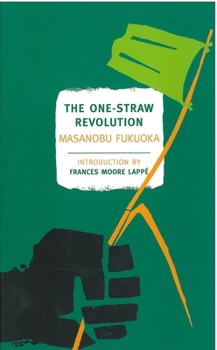The One-Straw Revolution: An Introduction to Natural Farming
Select Format
Select Condition 
Book Overview
Call it "Zen and the Art of Farming" or a "Little Green Book," Masanobu Fukuoka's manifesto about farming, eating, and the limits of human knowledge presents a radical challenge to the global systems we rely on for our food. At the same time, it is a spiritual memoir of a man whose innovative system of cultivating the earth reflects a deep faith in the wholeness and balance of the natural world. As Wendell Berry writes in his preface, the book "is valuable to us because it is at once practical and philosophical. It is an inspiring, necessary book about agriculture because it is not just about agriculture." Trained as a scientist, Fukuoka rejected both modern agribusiness and centuries of agricultural practice, deciding instead that the best forms of cultivation mirror nature's own laws. Over the next three decades he perfected his so-called "do-nothing" technique- commonsense, sustainable practices that all but eliminate the use of pesticides, fertilizer, tillage, and perhaps most significantly, wasteful effort. Whether you're a guerrilla gardener or a kitchen gardener, dedicated to slow food or simply looking to live a healthier life, you will find something here-you may even be moved to start a revolution of your own.
Format:Paperback
Language:English
ISBN:1590173139
ISBN13:9781590173138
Release Date:June 2009
Publisher:New York Review of Books
Length:200 Pages
Weight:0.60 lbs.
Dimensions:0.6" x 5.2" x 7.9"
Customer Reviews
4 ratings
wonderful
Published by Thriftbooks.com User , 21 years ago
I read this book years ago when it was first published and it has been a magor influence on me and my gardens for all these years. I've followed Fukoka's ideas as much as closely I can living in a city and have had wonderful results. He is right, let nature do the work. My garden is the most beautiful in the neighborhood, and without any pesticides, fertilizers, tilling, or backstrain. Buy this book, Gaia's Garden, and Forest Gardening. They all follow the naturalistic, symbiotic, permaculture mode that mother nature has been evolving for a billion years - just plug into the natural order and start growing!
Phenomenology or Farming?
Published by Thriftbooks.com User , 21 years ago
Some have said that the Fukuokan philosophy is the tap root of what is now more broadly called Permaculture, only Masanobu Fukuoka was a Japanese farmer, working with rice and winter grain in a southern Japanese climate. Both are no-till methods that shun the use of chemicals. However, Fukuoka should be set apart from farming in general and Permaculture in particular, in that The One-Straw Revolution is essentially a profound work of literary philosophy. Indeed, in many cases it reads like a naturalist's bible. Although the book is dressed in the language and anecdotes of a farmer, the message looms much larger. We read of a man who came to terms with the problem of death, and then decided to form a profoundly new (or is it old?) relationship with nature. In essence, the nugget of his wisdom is that, instead of struggling to control and command nature, we must learn to work with and learn from nature. Allow me to share one quote:"To build a fortress is wrong from the start. Even though he gives the excuse that it is for the city's defense, the castle is the outcome of the ruling lord's personality, and exerts a coercive force on the surrounding area. Saying he is afraid of attack and that fortification is for the town's protection, the bully stocks up weapons and puts the key in the door." Now I ask you, does the following paragraph sound like the words of a farmer or a philosopher? From the face of it, one might think Fukuoka is here criticizing the nuclear arms race, but he is actually talking about the warlike mindset of farmers who see leaf-munching pests as evil enemies that must be fortified against, sought out and destroyed. Whether we are talking about bull weevils or communities, though, his advice is sound. We must change our frame of reference and establish a different relationship with the world. Concise and yet elegant, Fukuoka's prose is pregnant with meaning. Altogether, this work provides poetic an intelligent critique of industrial agricultural practices and the linear notions of nature and progress that underlay those practices. In fact, Fukuoka goes as far as to declare that the scientific method itself limits our experience and knowledge of nature. An invaluable, timeless work that will move you, even if you have never picked up a hoe. j.w.k.
You'll See The World With New Eyes
Published by Thriftbooks.com User , 22 years ago
This book isn't just for farmers or environmentalists. It will open your eyes and make you see the world differently. Suddenly it will become all one world, living and breathing and entirely whole. I bought this book from Mother Earth News years ago and had no idea that just seeing things from this man's point of view would change me so much. I loaned it out to people, and each time the reaction was the same. Everyone was enthralled. I lost my book to someone who never returned it, so someday I'll have to shell out the dough to replace it. It awakens you to a perspective so precious that you don't ever want to risk forgetting it. We're all part of this great being we live on. I wish the entire world could view themselves with the same eyes a person gets upon reading this book. We'd all be transformed.
Both theoretically and operationally beautifully simple.
Published by Thriftbooks.com User , 26 years ago
Fukuoka comes out of an experience of environmental endagerment (Post-WWII Japan). This work shows the basics of a workable lifestyle that is kind to both nature and people. It is one of the very best of the low-tech/low-work, back-to-the-land guides. This formula is the first of the practical endeavors at post-Post-Modern living- where people have to do for themselves.






